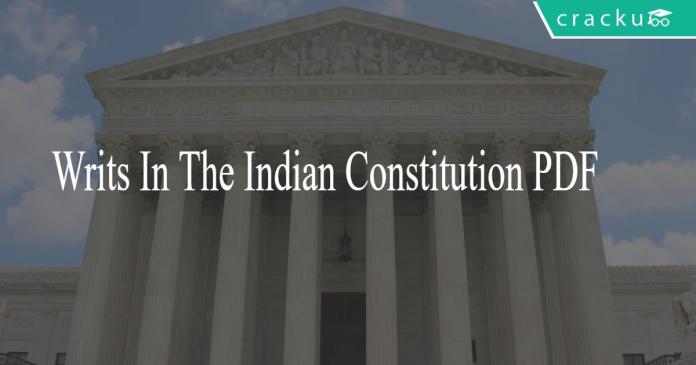Writs in the Indian Constitution PDF:
Download the Writs in the Indian constitution PDF that contains the complete information regarding writs including the eligible issuers, meaning of writs, conditions when writ can be issued.Writs are very important for UPSC, SSC, RPF, Banking & other competitive exams.
Download Writs in the Indian Constitution PDF
All Banking/SSC/RRB Content @ Rs. 199
Download Daily & Monthly Current affairs quiz PDF
Download all General Knowledge Questions & Answers PDF
Download Current Affairs Questions & Answers PDF
Download General Science Notes And Q&A PDF
Supreme court under Article 32 & High Court under Article 226 can issue writs. The parliament can confer the power to issue writs on any court. But at present, no court other than Supreme Court & High Court can issue the writs. There are 5 writs mentioned in the Indian Constitution. They are
1)Habeas Corpus
2)Mandamus
3)Prohibition
4)Certiorari
5)Quo-Warranto
These writs has been borrowed or taken from the English law. They are known as the ‘prerogative writs’ in Britian as they are exclusive privilege of the Crown, later the High Courts.
Difference between writ jurisdiction of Supreme Court & High Court:
1.Supreme Court can issue writs only for the enforcement of Fundamental Rights while High Court can issue writs for the enforcement of Fundamental Rights & Ordinary Legal Rights.
2.Supreme Court can issue writs against a person residing or any authority within the territory of India.High Court can issue writs against a person residing or any authority within its territorial jurisdiction or outside of the territorial jurisdiction if the cause of action is within its territorial jurisdiction.
3.Supreme Court cannot refuse to exercise its writ jurisdiction as Article 32 itself is a Fundamental Right while High Court can refuse to exercise its writ Jurisdiction under Article 226.
1.Habeas Corpus:
1)Its literal meaning is ‘to have the body of‘.
2)It is an order issued by the court to produce the detained person infront of it to check the legality of the detention.
3)Writ is issued against both public authorities as well as private individuals.
2.Mandamus:
1)Its literal meaning is ‘We command’.
2)It is an order issued by the Court asking a Public official to perform his/her duties.
3)Writ can be issued against any Public body, a corporation, an inferior court/ tribunal.
4)Writ cannot be issued against private individual/body, president, state governors & Chief Justice of a High Court.
3.Prohibition:
1)Its literal meaning is ‘to forbid‘
2)It is issued by a higher court to a lower court to prevent the exceeding of jurisdiction.
3)It is issued against judicial & quasi-judicial authorities.
4.Certiorari:
1)Its literal meaning is ‘to be certified’ or ‘to be informed‘.
2)It is issued by a higher court to a lower court either to transfer pending cases or squash orders on the grounds of excess of jurisdiction or error of law.
3)The writ can be issued only against judicial & quasi-judicial authorities, administrative authorities.
5.Quo-Warranto:
1)Its literal meaning is ‘by what authority or warrant‘.
2)It is issued to verify the legality of claim of a person to an office.
3)It can be issued against public office of permanent character created by the statute or constitution.
4)It cannot be issued against ministerial or private office.
NOTE: Quo-Warranto is the only writ that can be sought by any interested person not necessarily by an aggrieved person.





